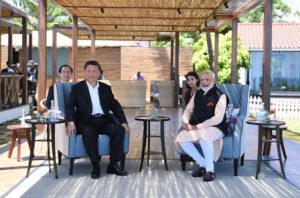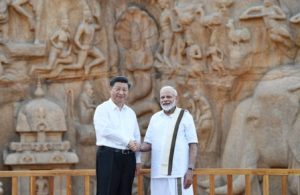Mamallapuram: The Elephant–Dragon Tango
A summit took place in the backdrop of Chinese outright support to Pakistan on the issue of Jammu and Kashmir.

The second informal summit between India and China took place on 11th and 12th October. The event took place in the coastal town of Mamallapuram or Mahabalipuram, some 50 km south of Chennai. As briefed by MEA, Mamallapuram was selected for the summit by the prime minister himself, owing to its historical significance and infrastructure. The town known for its exquisite rock-cut sculptures, with the wide expanse of the Bay of Bengal in the backdrop, was established in the 7th century by Pallava King Narsimhavarman. The Pallavas are said to have carried out trade with China through this port city. Also, the revered Chinese monk Bodhidharma is said to be the third son of a Pallava king.
Also Read : Vanakkam Beijing
The summit took place just weeks after China outrightly supported India’s arch-rival Pakistan on the issue of reorganization of the state of Jammu &Kashmir and its full integration with the Indian Union. China called an ‘informal on 16th August, regarding India’s unilateral decision on Kashmir. Chinese Foreign Minister Wang Yi again raised the issue in the UNGA, and most recently, just before President Xi’s visit to India, Pakistan’s PM Imran Khan and the army chief Qamar Javed Bajwa were in Beijing. In a joint statement, the Chinese leader asserted that he was watching the situation in Kashmir closely and would support Pakistan on issues related to its core interests, as reported by Xinhua News Agency. Moreover, Indian Army conducting war games in Arunachal Pradesh, early this month, so close to the summit was another indication of aggravation in ties between the two nations.

On the first day of the two-day summit, President Xiwas accorded a grand welcome when he arrived at the Chennai airport. Chinese President was accompanied by high-ranking officials, prominent among whom were the Foreign Minister Wang Yi and the state councillor Yang Jiechi. After arriving at Mamallapuram, the Chinese President was accompanied by the Indian PM to showcase the historical architectural treasures of India. Dressed in the traditional veshti, white cotton shirt and an angavastram, PM Modi toured him across the world heritage sites such as the Arjuna’s penance, Krishna’s Butterball, Pancha Ratha and the Shore Temple. The leaders having coconut water in the backdrop of the Pancha Ratha showcased positive atmospherics and bonhomie, amid the recent disruption in ties. This was followed by a cultural event, with the rich Tamil culture in full display. The day ended with a private dinner at the majestic Shore Temple, hosted by the Indian PM for his Chinese counterpart. In the two-and-a-half-hour discussion over dinner, a range of issues was covered, prominent among which were trade and investments. The two leaders also vowed not to let ‘terrorism and radicalization’ hamper the multi-cultural, multi-ethnic and multi-religious societies of the two countries.
In the discussions on Day 2, the two sides agreed to set up a high-level investment and trade mechanism with the Indian Finance Minister Nirmala Sitharaman and Chinese Vice Premier Hu Chunhua as members, as briefed by the MEA. Both the sides agreed on continuing the efforts to arrive at a mutually-agreed framework on the issue of boundary disputes’ settlement. Year 2020 will be observed as Year of India–China Cultural and People-to-People Exchanges, with over 70 activities planned to observe the event. Also, a relationship will be established between Tamil Nadu and China’s Fujian province that had maritime and commercial relations for thousands of years. Interestingly, President Xi Jinping had served as the governor of the Fujian province from 1999–2002.
Also Read : Fatf Retains Pakistan On Its Grey List
The summit haven taken place in the backdrop of hostile statements and actions of China regarding Kashmir, and the Indian PM not showing any antagonism, shows the high degree of importance the two countries impart on relations between them. As expected, the Kashmir issue wasn’t raised and discussed, as briefed by the Secretary of MEA Vijay Gokhale in the press briefing. Chinese did iterate to work on reducing India’s trade deficit with it, which reached more the US$63 billion in the last fiscal. Chinese asserted to address India’s concern on the Regional Comprehensive Economic Partnership (RCEP) that will establish an FTA between the ten ASEAN and its six FTA trading partners, namely, Australia, New Zealand, Japan, South Korea, India and China. The agreement is due to be signed in December. The two sides reiterated the need for a rules-based global trading system. Greater defence cooperation was also stressed upon by President Xi.
The first informal summit at Wuhan took place in the backdrop of the Doklam standoff that brought the armies of the two nuclear-armed nations face-to-face. The Wuhan spirit played its role in easing tensions and strengthening ties. The relation has not worsened to that degree, but a certain level of deterioration in the recent past is quite visible. Hence, strengthening and stability in ties is what is expected out of the summit at Mahabalipuram.
